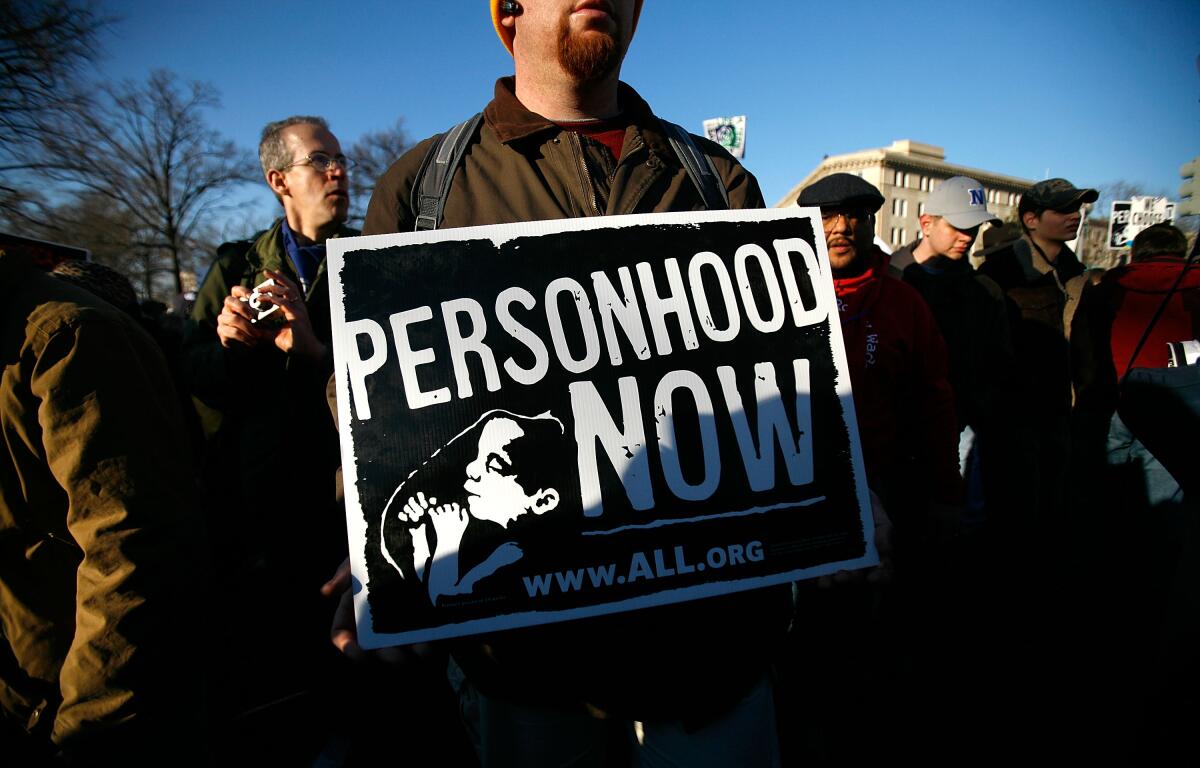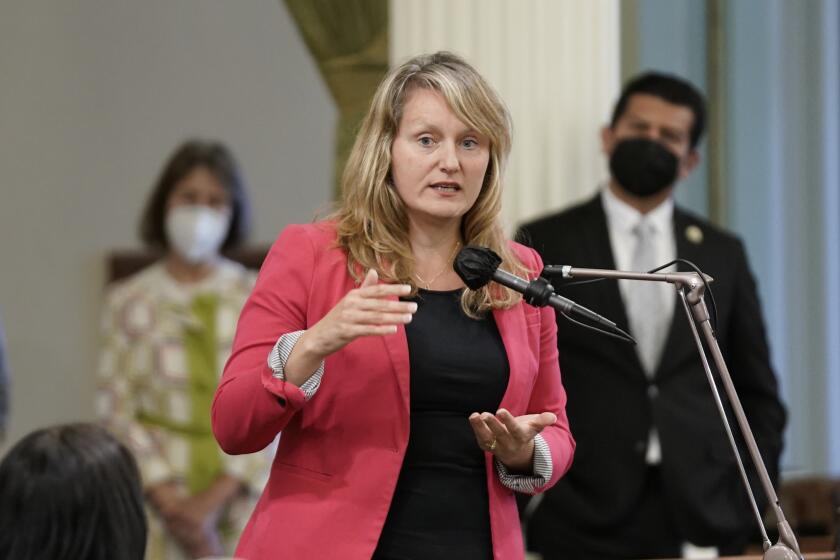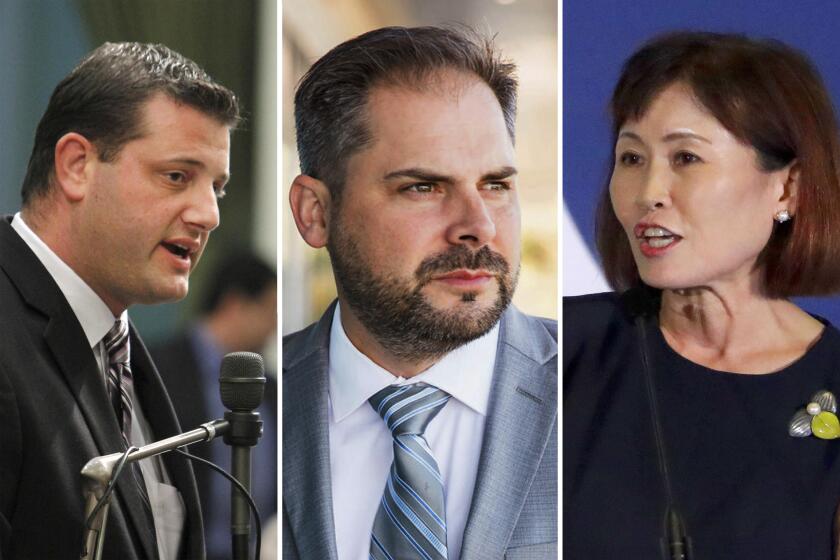Op-Ed: ‘Fetal personhood’ has a whiff of medieval theology

A pregnant body is an anomaly. I mean this in a technical sense, because the body of a woman with a developing child growing in her belly literally does not fit into the system of categorization that’s long been the de facto standard for Western culture.
Is a pregnant body one person or two? If you believe the antiabortion movement, the answer is clear: A pregnant body is two distinct persons and one of those persons — the woman — does not have the right to take away the “life” of the other.”
But this argument rests on a presumption about what constitutes a person.
Is a tiny clump of cells a distinct human being? And what do we even mean by “distinct human being”?
In modern Western philosophy, particularly since Descartes, a person is conceived of as an entity with independent intellectual agency. “I think therefore I am,” he famously declared. Descartes, a Catholic, was putting into secular terms a way of categorizing that he’d adapted from the church, which has traditionally held that human being-ness is predicated on an individual self with free will, and thus the capacity to distinguish right from wrong.
Even a state like California, with its progressive abortion laws, needs the right to abortion enshrined in its state constitution.
For Catholics, then and now, the key issue is not thinking, but the ability to make moral decisions.
I was raised Catholic, and the concept of moral choice was ingrained in me. For Christians, free will isn’t an abstract academic issue. It’s the foundation for an ethical life that truly has consequences, the ultimate one being whether you end up in heaven or hell.
So, let’s get back to the fetus. A small bunch of cells clearly doesn’t have free will. It doesn’t have a will at all. It can’t make moral or intellectual choices. It doesn’t yet have a brain, let alone a mind. If, as Christianity and modern Western philosophy predicate, humanness requires mental agency, in what sense is a cluster of cells a human being?
Reading claims made by antiabortion advocates that a group of cells is a “person” from conception onward calls to mind the endless medieval debates about the resurrection of the body.
For premodern Christians, resurrection was a very real event, and it wasn’t just the soul that would live again in paradise. The body too would be revived and received into the light of the Lord.
But this raised problems. As Caroline Walker Bynum, a scholar of medieval Christianity, has written about eloquently, if a body is going to be resurrected into heaven, then which version of that body will it be? Will my body be resurrected at age 90, when I die old and decrepit. Or will I get the body I had in my fit-as-a-fiddle 20s?
The Supreme Court’s Dobbs decision deepens the national divide on abortion.
According to medieval theology, animals are also going to be resurrected, so what will happen to the cows and pigs and fish whose bodies have been consumed and reincorporated in other animals or humans? Is the consumed flesh theirs or their consumers? Which flesh will be resurrected?
What about cannibalism? If a person eats another person, whose flesh is whose, and what will this mean when Judgment Day arrives and all beings are revitalized?
Today these questions sound absurd, but in antiabortion arguments we are witnessing the reemergence of a similar fanatical desire to draw irrevocable distinctions around personhood and bodies.
As we have seen, the mother-fetus complex does not fit comfortably into either the Catholic or Cartesian concepts of an independent agent. And it is no coincidence both ideas have been promulgated by men, who have never had to deal with the ambiguity of bodily entanglement.
We might all agree that at some point the fetus becomes an independent being. But when does this differentiation occur? Certainly not at conception.
In the two months since the Supreme Court overturned Roe vs. Wade, Republican candidates have been noticeably quiet on the abortion issue.
Growing up Catholic, it always seemed to me the church’s theology was based on an obsession with the adult male, a person who could choose the life he wanted to live: Jesus chose martydom, the apostles opted for discipleship, St. Francis of Assisi gave up his wealth for a life of poverty.
My mother, however, was perpetually pregnant, with little choice of her own in determining the kind of life she might have wanted to lead. She had six children in 5½ years when the rhythm method was the only method of contraception available to Catholics in 1960s Australia. “Giving it all up” was hardly an option.
Bynum has written about the contortions medieval theologians got into with their interminable parsings about the ownership of flesh. The antiabortion movement engages in a similar rhetorical exercise. Its adherents want to insist that every bit of flesh belongs clearly to some body, including the fetal body. Thus the fetus must at all points be accorded the status of an independent being.
Both philosophically and practically, the mother-fetus relationship stands outside Western obsessions with individuality. A person bearing a child is at once an individual and a collective. Neither Christian theology nor modern philosophy seem able to accommodate this ambiguity or comprehend the tension of being one’s own self, with an as-yet-unrealized potential self forming within one’s flesh.
Margaret Wertheim is a science writer and artist. She is the author of “Pythagoras’ Trousers,” a cultural history of physics and religion, and six other books.
More to Read
A cure for the common opinion
Get thought-provoking perspectives with our weekly newsletter.
You may occasionally receive promotional content from the Los Angeles Times.













